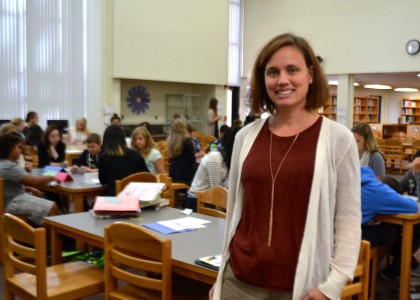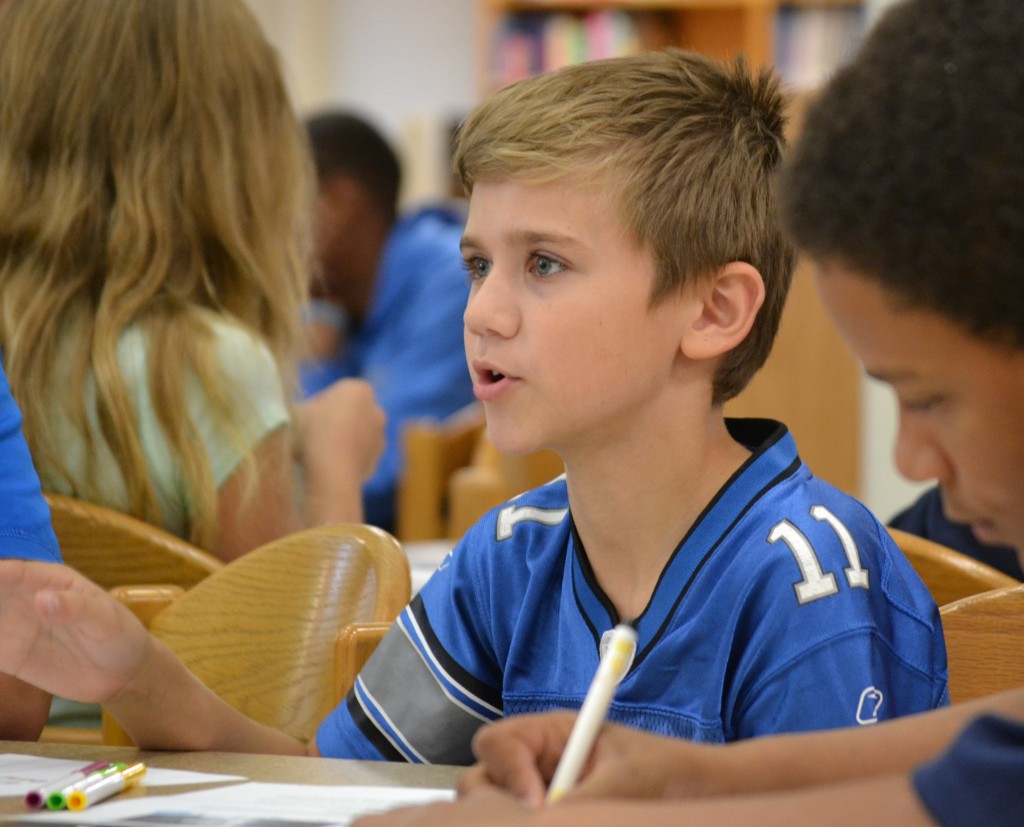
Story and photos by Jo Mathis, AAPS District News
Scarlett Middle School students tonight will teach their parents a thing or two about staying safe in the digital age.
During Digital Citizenship Parent Night, the students will show the social media posting guidelines they’ve learned over the past weeks working with University of Michigan teaching interns. This project is one of multiple activities in the Mitchell Scarlett Teaching and Learning Collaborative.
The Digital Citizenship Project is a collaborate project between Scarlett Middle School ELA teachers and the University of Michigan School of Education’s undergraduate and master’s level elementary teacher education programs.
The project focuses on the learning goals of AAPS’s digital literacy in the ELA Scope and Sequence, the IB learner profiles integrated at Scarlett, and the national education technology standards for students.
UM Clinical Assistant Professor Liz Kolb said that it’s important to know that digital safety is not a talk, but a conversation.
“And it’s something you want to open the door to, especially in middle school, because so many students are introduced to social media at this age. You want to make sure they’re comfortable talking to you about what they’re doing online, what they want to do, and keeping those lines of communication open at all times instead of immediately having a reaction of, `No, don’t,’ say, `Tell me more about it. Let’s look at the software you want to use. Let’s set up a profile together to make sure it’s safe and private.’”
Facebook these days is considered “Mombook,” said Kolb, noting that students prefer chatting messaging tools such as Kik Messenger, Snapchat, and Instagram.
“Middle school students are much more likely to be on Twitter than they are to be on a Facebook type resource,” she said.

The interns have worked under the guidance of Kolb as well as Scarlett Middle School teachers Sarah Andrew Vaughn, Sal Barrientes and Elliot Begley.
“In the same way it’s important for us to make clear lessons about what we expect for students at school,” said Vaughn, “it’s important that we help students make clear distinctions about how they behave online. When these lessons are coming from the U-M interns, they feel very fresh and relevant because the students believe the U-M interns when they say, `This information is permanent! Be thoughtful about what you share online.’”
According to Kolb, middle school is an important time to start these conversations because most middle school students do not begin sixth grade with social media sites, but by the time they leave eighth grade, about 80 percent of them will be heavily involved in them.
“Thus it is important to give students the tools and resources to know how to set up safe profiles, how to handle difficult conversations online, and that it is OK to tell a trusted adult if something is happening in their digital world that makes them uncomfortable,” she noted.
The U-M interns have designed mini lessons for the middle school students on three focus areas of digital citizenship: digital discourse (how we talk to each other online), digital safety (how we keep personal information private online) and digital identity (who do we want to be online in our permanent record).
The interns taught their lessons to small groups of middle school students in the ELA classes that facilitate discussion around these topics. Each middle school class created a social contract of digital posting guidelines that they will use throughout the school year as a guide on how to be safe, respectful and responsible in their digital life.
These guidelines focus on how to be safe, responsible and respectful online and when using digital devices (such as mobile phones). The sixth graders have created comic strips, while the eighth graders developed infographics they’ll share.
Digital Citizenship Parent Night will be held from 6:30 to 8 p.m. tonight (Oct. 8) at Scarlett Middle School.

Be the first to comment